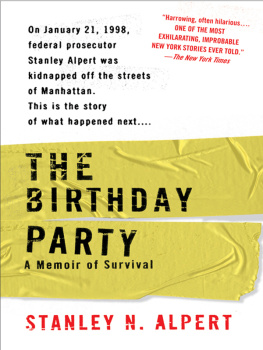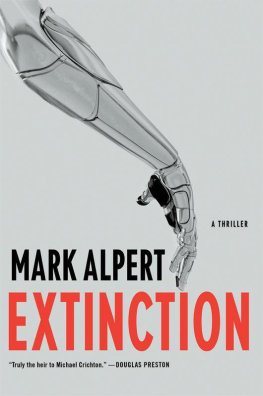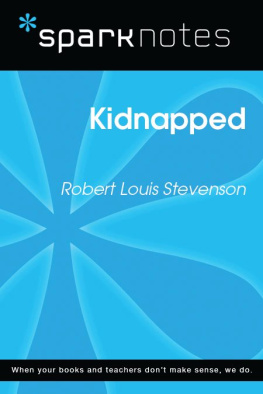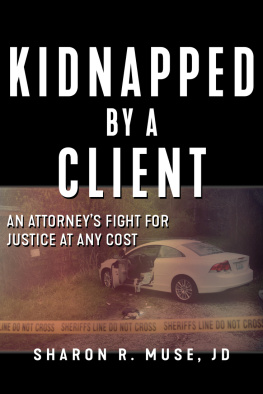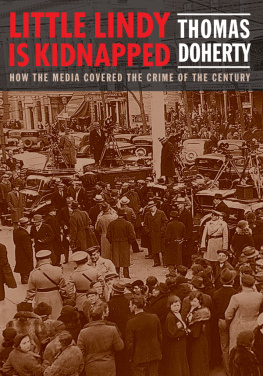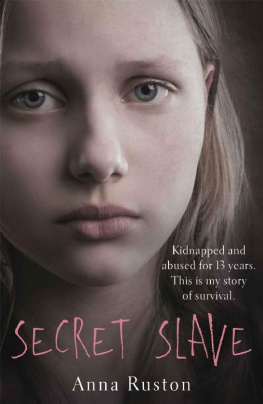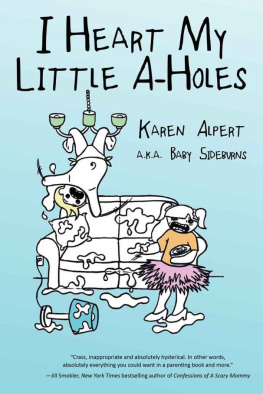CONTENTS
About the Author
Stanley N. Alpert served for thirteen years with the U.S. Department of Justice, as an Assistant U.S. Attorney for the Eastern District of New York, where he was Chief of Environmental Litigation. There, Alpert investigated, prosecuted and supervised many complex civil and criminal cases, some resulting in multi-million-dollar awards. He now runs The Alpert Firm in New York City, where he lives.
About the Book
On the night before his thirty-eighth birthday, federal prosecutor Stanley Alpert was kidnapped by a carful of gun-toting thugs. They were looking to use his ATM card, but when they learned his bank balance, the plan changed. They took him, blindfolded, to a Brooklyn apartment, with the idea of going to a bank the next day and withdrawing most of his money. His captors alternately held guns to his head, threatened his family, engaged him in discussions of gangsta philosophy and sought his legal advice before eventually releasing him in a manner which has to be one of the most bizarre in the history of crime.
Told from Alperts memory and notes; interviews with NYPD detectives, FBI agents and witnesses; videotaped confessions and court records, Kidnapped reads like a thriller but every word is true.
Kidnapped
Stanley N. Alpert

This book is dedicated to my parents, Arlene and Ben, who taught me that helping those less fortunate than us was more important than amassing wealth, and to my grandparents Leon and Flora, who gave me comfort and strength when I needed it.
AUTHORS NOTE
This book is all true, nonfiction. The quotes during the kidnapping are re-created from what actually happened and are obviously not a perfect transcript, though every event described in those quotes and the rest of the book really happened just as I tell it. Where the quotes seem the most outrageous or funny they are closest to actual, direct quotes, according to my memory. Descriptions of events that occurred where I was not present and some of the dialogue in connection with those events are re-created based upon interviews with the people involved. The details of the investigation are based on police reports, interviews with NYPD detectives and FBI agents, interviews with witnesses, videotaped confessions, and court records. The records directly confirm a good deal of the kidnapping details that I relate from memory. Where opinions are expressed, that is what they are. Many of the names, particularly last names, have been changed to protect the innocent and the guilty. Street addresses have been changed, as well. The names of the detectives and agents are real.
I want to thank my agent, Ron Goldfarb, for seeing the value in this book and inspiring me to finish it. Thanks to the people at PutnamNeil Nyren, Ivan Held, Susan Allison, and Michael Barsonfor their decision to publish this book and the genuine human concern they exhibited about what I had experienced, and to Neil Nyren for his wonderful and incisive edits.
PART ONE
MOUSE
ONE
BROOKLYN FED
IN NEW YORK City, 1998, crime was down, but not out, as I was to learn the night before my thirty-eighth birthday. All the experts agreed that it should have gone the other way. My case should have been handled as a homicide.
Blindfolded, I could hear the leader of the gang pulling duct tape off a roll, the sound framed by a bitter night wind that filled the open trunk of the car where my body was headed. I sat in the backseat on the hump, a gangsters right leg pressed to my left, another gangsters leg pressed to my right, each jabbing a pistol at my chest. I had no idea why God had done this to me, and I felt definite I was about to meet Him and find out.
Maybe it shouldnt have been a big surprise. I grew up in New York in the 1970s, and things had been a little unbalanced then: Vietnam, drugs, race riots, and crime, crime, crime. My grandparents and great-grandparents had sailed to America for streets rumored to be paved with gold, but for me, Brooklyn had had streets paved with land mines. Getting off the bus on my way home from a high school night out, I would have to steel my nerve and sharpen my senses, praying that no figures would emerge from an alley or behind a parked car, knives unsheathed, faces gripped with determination, those with less taking little from me. I cant tell you how many times I ran, fought, or gave up a few bills to buy the bastards off.
Giuliani had put an end to all that by 1998, or at least thats the way the publicity made it sound. Cops had been given freer rein to bust heads and reclaim the streets. Murders were down by two-thirds. Kids from the Midwest sporting goatees rode the L train home at night without a care in the world other than Corona versus Amstel. Tourists were flocking back to Times Square to catch The Lion King and drop a few bucks on a Midtown hotel. It was nothing short of a renaissance. Or so I thought.
Id begun my career with a federal court clerkship in Miami, then come back to New York City to work at a fancy Park Avenue law firm, which for a kid whod toughed it out on the streets of Brooklyn was a big deal. But my heart told me I needed to do something bigger with my life, and when the offer arrived in 1990 from Andy Maloney, U.S. Attorney for the Eastern District of New York, to become an Assistant U.S. Attorney, I knew I was going to take it, even if it meant going back to Brooklyn. Brooklyn was a place to grow up and get out of after all the excitement of the disco days. But this was progress. The office of the United States Attorney for the Eastern District of New York covered Brooklyn, Queens, Staten Island, and all of Long Island. Long Island: the home of Joey Buttafuoco, Texas-style high hair, and some of the finest white sand beaches anybodyd ever want to sift through their tired bare toes.
Maybe because I was a city boy whose skin touched asphalt as often as a snakes touched grass, I was all the more keen on the outdoors. In Maloneys office, I became an environmental prosecutor, to try to keep those beaches clean. Most of my defendants did not put guns to peoples heads to make them turn over their money. My law enforcement career dealt with contamination of the air, water, and land, threatening the basic quality of human life. Industry in America needed to be properly regulated and violators relentlessly pursued by the federal, state, and local governments. Otherwise they gave you widgets plus some surprisingly nasty free gifts: asthma, genetic mutations, filthy air, and lakes and oceans where the fish gasped and the humans were required by local authorities to keep their butts out of the water. Black mothers in the Bronx wanted to know why their kids had so much more asthma than the separate but equal children in the Village of Scarsdale, and I wanted to help.
As a federal prosecutor, I got to hunt bad guys, those who killed people the slow way. My bad guys kept Sloan-Kettering in business. They wore thousand-dollar suits when they sent their loyal employees to inhale the sweet aroma of a benzene pool knowing that nobody would wear the respirators even if they knew where to find them. They poisoned the fish so that when a Latino casts his sorry rod in the Dyckman Street Hudson, what sits under the cilantro and next to the pltanos that evening will eventually kill a member of his family. My bad guys put profit over human health and safety, and it was my job to stop em cold in their tracks. If it was a typical violation, youd pay me a heavy penalty and clean up your mess and have a court supervise you for the next ten years. If the violation was rotten to the core, you could go directly to jail do not pass go.
Next page

